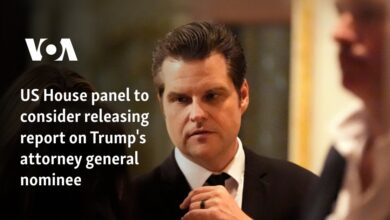How Trump’s ‘America First’ policy threatens WTO trade rules – DW – 12/16/2024

Multilateral organizations like the World Trade Organization (WTO) hold little significance for US President-elect Donald Trump, who views them as contrary to US interests. The former German ambassador to China, Michael Schaefer, even believes that Trump considers any prolonged search for compromises in those institutions “a waste of time.”
Trump’s perception of the world, he told DW, is so fundamentally different from what proponents of a rules-based world order would support that his first term in office will likely be considered a “walk in the park” compared with what he’s planning to do now.
“There is a stark difference in philosophy regarding how the international community should function,” he said.
In order to end “centuries of conflict and war,” Europe, for example, has come to be a group of diverse states that established “a rules-based system, built on mutual obligations and rights,” Schaefer said. This framework extends beyond Europe to guide global interactions in foreign, security, and economic policy, the former diplomat said.
Trump’s so-called America First policy approach, however, is completely different, prioritizing “direct negotiations with trade partners, and leveraging US power for advantage.”
The end of globally accepted trade rules?
Heribert Dieter, a trade expert at the German Institute for International and Security Affairs (SWP), believes the end of multilateralism in international policy will have severe implications, particularly for smaller nations in the so-called Global South.
“We assumed after the Soviet Union’s collapse that supranational solutions were feasible. But in today’s era of geopolitical blocs, that is no longer the case,” he told DW.
Dieter, who is currently teaching at the National Institute of Advanced Studies in Bengaluru, India, added that the WTO is “a shadow of its former self” and particularly struggling. “Its dispute resolution mechanism is no longer functional, and the outlook for multilateral trade governance is bleak.”
Experts warn that dismantling the trade body and its globally accepted rules would have significant consequences, even for major players.
A study by the Germany-based Kiel Institute for the World Economy and the Austrian Institute of Economic Research revealed that the collapse of the WTO would hit the European Union economy four times harder than the tariff hikes planned by Trump.
As a result, the report said, real gross domestic product (GDP) in the EU could decline by 0.5%, “with Germany suffering more and the US slightly less. China would face the steepest losses.”
The study further cautioned that a world divided into geopolitical blocs led by the US and China would result in even greater economic damage, particularly for the EU and China. Under extreme scenarios, China’s real GDP could fall by 6% and that of Germany by 3.2%, while the US economy would take a smaller hit of minus 2.2% growth.
Fight against poverty facing backlash
While the European Union is the world’s most connected trading bloc with a total of 45 trade agreements signed with global partners, smaller countries with fewer trading partners stand to suffer most from a collapse of the WTO.
“WTO is significantly more important for smaller, less powerful countries with limited trade networks, who have historically relied on the WTO’s dispute settlement mechanism to protect their interests,” said SWP’s Heribert Dieter, adding that this worked very well for them in the past, but is being undermined since 2018 by Washington’s refusal to agree to new WTO judges.
Noting that the powerful trading nations can “enforce their interests without the WTO,” smaller nations are increasingly forced to “bow to the often questionable demands of larger countries,” he said.
Former World Bank Chief Economist Pinelopi Goldberg also considers smaller countries to be the “primary losers” of the current stalemate at WTO. “International integration [in trade] is essential for them because they are lacking large domestic markets,” she told DW. “Latest research is showing that poverty reduction over the past three decades has happened mainly in those developing countries which are closely interlinked with global trade,” she said, highlighting the role of the multilateral system in enabling progress for the Global South.
However, many countries in Africa have so far failed to play a significant role in global trade, mostly having secured less than five trade agreements. Among them are conflict-ridden South Sudan and Burundi, which are persistently losing ground.
In Latin America, Venezuela, Ecuador and Bolivia are among those least connected to global trade, while in Asia, nations like Afghanistan and Mongolia remain underrepresented in trade deals.
Comeback for US interventionism
For Heribert Dieter, much is pointing to the end of the era of a rules-based trade order, with the optimism for fairer global trade that accompanied the WTO’s founding in 1995 now seemingly only “a brief exception in history.”
Already in the late 1990s, the United States increasingly pursued its own interests, particularly within the International Monetary Fund (IMF). At the time, IMF restructuring programs for heavily indebted nations had borne the hallmarks of heavy-handed US intervention, says Dieter. “They weren’t rescues at all. They were US foreign economic policy with a strong disregard for the interests of the recipient countries.”
International trade cooperation will continue, albeit on a much smaller scale, thinks Heribert Dieter, which isn’t “necessarily a bad thing.”
“In smaller frameworks, trade policy might actually achieve more than within the WTO, where every member state has veto power. This doesn’t mean the end of international economic relations, and certainly not the end of globalization,” he said.
However, challenging times are lying ahead for smaller countries in the Global South, believes the ex-diplomat Michael Schaefer, as they would have to “brace themselves for the worst to come.”
This article was originally written in German.




